-
 Art of Wellness Acupuncture & Traditional Chinese Medicine (TCM)11704 Wilshire Blvd, Suite 295, Los Angeles, CA, 90025
Art of Wellness Acupuncture & Traditional Chinese Medicine (TCM)11704 Wilshire Blvd, Suite 295, Los Angeles, CA, 90025
myartofwellness@gmail.com310-451-5522 Office Hours
MonClosedTue7:30 am --4 pmWed7:30 am --4 pmThu7:30 am -- 4 pmFri7:30 am -- 4 pmSat7:30 am -- 4 pmSunClosedOur office opens from Tuesdays to Saturdays 7:30 am to 4 pm, will be closed on Memorial day, Independent day, Labor day, Thanksgiving day, Christmas and New year.
-
Recent Posts
- Acupuncture for Sciatica Pain
- Can Acupuncture Help With Bladder Control?
- How to Treat De Quervain’s Tenosynovitis With Acupuncture and TCM
- Chinese New Year 2026: Year of the Horse
- Acupuncture and TCM Treatment for Perimenopause Symptoms
- How to Treat Insulin Resistance With Acupuncture and TCM
- How to Treat Metabolic Syndrome With Acupuncture and TCM
- How to Treat Syncope With Acupuncture and TCM
- How to Treat Thoracic Outlet Syndrome With Acupuncture and TCM
- How to Treat Dupuytren’s Contracture With Acupuncture and TCM
- How to Treat Nutcracker Syndrome With Acupuncture and TCM
- How to Treat Rosacea With Acupuncture and TCM
- How to Treat Perioral Dermatitis With Acupuncture and TCM
- Lymphatic Drainage With Acupuncture and TCM
- How to Treat Turf Toe With Acupuncture
- How to Treat Nerve Pain With Acupuncture and TCM
- Sign up to receive news and updates and get my free report:“The Top 10 Reasons to Try Acupuncture”

February 2026 M T W T F S S 1 2 3 4 5 6 7 8 9 10 11 12 13 14 15 16 17 18 19 20 21 22 23 24 25 26 27 28
What We Treat
How to Treat Appendicitis With Acupuncture and TCM
by Qineng Tan, L.Ac., Ph.D. and Xiaomei Cai, L.Ac., Ph.D.
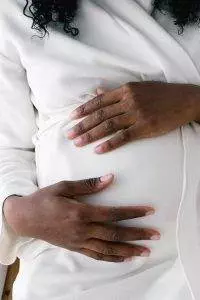
Sudden pain right lower abdomen or pain that starts around your navel? Nausea or vomiting? These may be appendicitis symptoms. Appendix pain is a sign of appendicitis, or an infected and inflamed appendix. Acupuncture and TCM offer an adjunct treatment for appendicitis that can help relieve appendicitis pain.
The appendix is a small, tube-shaped organ that extends off of the lower part of the large intestine. What side is your appendix on? The appendix location is in the lower right quadrant of your abdomen.
What’s appendicitis? Appendicitis causes are generally related to infection and inflammation.
The appendix can become blocked by a bacterial infection, a viral infection, a parasite, or a tumor. Sometimes fecal matter gets into the appendix, causing a blockage.
If the appendix becomes infected and inflamed, it can swell and even rupture; this is often called a “burst appendix,” or ruptured appendix.
If the appendix becomes so swollen that it begins to tear or rupture, stool can leak out into your abdominal area and cause peritonitis, a potentially very dangerous infection.
Acute appendicitis is a medical emergency and requires immediate medical attention.
Studies have shown that acupuncture and TCM treatment can help relieve appendicitis pain and swelling and improve outcomes for patients hospitalized for acute appendicitis.
Appendicitis Symptoms
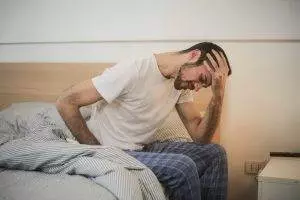
The signs of appendicitis often come on over a short period of time, usually beginning with a sudden pain in the middle of your belly around your navel, and then moving to the lower right side of your abdomen.
Appendicitis symptoms include:
- Sudden pain near or around the navel that migrates to the lower right side
- Sudden pain in the lower right quadrant of the abdomen
- Pain in belly is worse when you cough or are jarred
- Right belly is tender to the touch
- Constipation
- Diarrhea
- Urinary frequency or urinary urgency
- No appetite
- Low grade fever
- Malaise, generally feeling ill
Appendicitis tends to develop through a series of stages. The 4 stages of appendicitis are:
- Early or uncomplicated appendicitis, which is when a blockage has formed and swelling of the appendix begins. At this stage, the pain in the middle of the belly area may be just sort of a vague “stomach ache.”
- The appendix begins to fill with mucus. Without proper blood and lymph drainage, bacteria begin to proliferate inside the appendix.
- The swelling begins to make the tissue of the appendix and the surrounding intestine and bowel walls become stiff, sometimes forming an inflamed mass, which is called an “appendiceal phlegmon.” This can feel like a hard mass in the lower right abdomen when palpated.
- Blocked blood flow causes a lack of oxygen, so the tissues of the appendix become necrotic. At this stage, the wall of the appendix can begin to tear or rupture.
This process usually develops over the course of 12-24 hours. This is why appendicitis is considered a medical emergency. It is very important that anyone experiencing this type of pain and other symptoms seeks urgent care.
Appendicitis Treatments and Appendectomy
Upon being admitted for testing, a person presenting with severe pain in the right abdomen will first need to undergo testing to be sure of a diagnosis of appendicitis.
There are several other conditions which could also cause abdominal pain in this area, including:
- Crohn’s disease
- Mittelschmerz, ovulation pain
- Ovarian cyst that has ruptured
- Ovarian torsion
- Endometriosis
- Ectopic pregnancy
- Pelvic inflammatory disease
- IBD
- Testicular torsion
- Right-sided colitis
- Kidney stone
While undergoing diagnostic testing such as MRI, CT-scan, or ultrasound, it is often common practice for doctors not to administer pain medications, the idea being that to do so might mask symptoms and delay proper diagnosis. This when acupuncture treatment can be particularly helpful. Acupuncture can have a proven analgesic effect for abdominal pain, without any side effects.
In general, appendix surgery is considered the gold standard treatment for acute appendicitis. Appendix removal can be done laparoscopically, or via incision.
Some cases of appendicitis may be treated with antibiotics and other medications over the course of several days or weeks, but often, in a significant number of cases, the appendicitis recurs.
Acupuncture and Chinese herbs can serve as an adjunct treatment for appendicitis patients, helping to relieve abdominal pain, regulate body temperature, and reduce inflammation.
Can Acupuncture Help Appendix Pain?
Appendicitis is an emergency situation, and people should definitely seek immediate medical care if they are experiencing right side abdominal pain and fever.
Acupuncture and TCM herbs can be used as complementary medicine, to help reduce hospitalization time and improve overall outcomes of conventional treatment for appendicitis.
While in some cases, appendicitis surgery may be necessary, there are other options. In some cases a combination of antibiotics to handle the infection, and acupuncture, herbs and moxibustion treatment to help relieve pain and inflammation may help to resolve appendicitis without surgery. This is known as NOTA: non-operative treatment for acute appendicitis.
According to TCM theory, appendicitis is considered to be related to blood stasis and stagnant Qi, as indicated by symptoms like: distended abdomen, nausea and/or vomiting, and a red tongue with a white, greasy coating. If the condition is also characterized by excess heat, then there may also be intense pain and muscle tension in the lower right abdomen, constipation, fever, a dry mouth, and dark-colored urine.

In this situation, an acupuncturist would use acupuncture points targeting the stomach, spleen, and large intestine to help move blood, Qi, and clear heat from the infected area. Moxibustion treatment, which involves burning a small amount of moxa herbs near acupoints, can also help to relieve fever and irritation.
These TCM treatments can help to support and boost the efficacy of conventional medical treatments for appendicitis.
In situations where an appendectomy is indicated, acupuncture and herbs can help speed recovery and help to improve intestinal function after surgery.
One study done on pediatric patients with appendicitis showed that acupuncture helped reduce inflammation and pain.
Another study compared patients hospitalized and treated for appendicitis. One group received antibiotics, pain relief medications, and a special diet. The other group received these treatments, plus acupuncture and herbs. Overall, the patients who received TCM treatment had reduced abdominal pain, more quickly resolved fevers, and were able to leave the hospital days earlier.
Acupuncture, and electro-acupuncture, can also be used to help with recovery and pain relief post-appendectomy, for those patients who do require surgery to remove the appendix.
Acupuncture for Appendicitis Near Me in West Los Angeles
Acupuncture and TCM can often be used in conjunction with conventional medical care as a way to offer additional support for pain relief, recovery, and regaining functionality. In the case of appendicitis, it is vital to seek medical treatment for what can potentially become a life-threatening emergency. Acupuncture and herbs can be used additionally, to help speed recovery from infection, and, when necessary, from surgery. TCM can help patients regain and improve their digestive function.
*This article is for education from the perspective of Traditional Chinese Medicine only. The education provided by this article is not approved by FDA to diagnose, prevent, treat and cure human diseases. It should not stop you from consulting with your physician for your medical conditions. Traditional Chinese Medicine is based on Qi, which is an invisible force that usually cannot be observed by modern science. Because science focuses on testing ideas about the natural world with evidence obtained through observation, these aspects of acupuncture can’t be studied by science. Therefore acupuncture and Chinese herbs are often not supported by double-blind, randomized trials, and they are considered alternative medicine therapies in the United States.
How to Treat Nausea With Acupuncture and TCM
By Xiaomei Cai, L.Ac., Ph.D. and Qineng Tan, L.Ac., Ph.D.
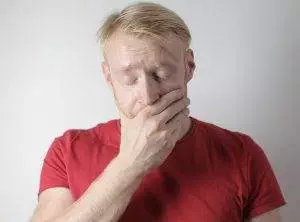
Feeling nauseous, nauseated, queasy? Feel like vomiting or throwing up? Nausea can be brought on by many different health conditions. Acupuncture and TCM can provide nausea help in many situations, whatever the cause of nausea.
Nausea is that feeling that you have to vomit, or throw up. It’s an uneasy feeling that is often referred to as being “sick to your stomach.” Feeling nauseous may or may not precede actually vomiting.
Nausea is a symptom, not a disease in and of itself. There are many different kinds of health issues that can make you feel nauseated, or cause you to vomit.
Symptoms of Nausea
A queasy stomach is often accompanied by other symptoms. Nausea can often include or coincide with:
- Feeling like you are going to vomit
- Stomach ache, pain in belly
- No appetite, stomach turns at the thought or sight of food
- Sweating, clammy skin
- Salivating, swallowing a lot
- Uneasy feeling in the back of your throat
- Contractions of the respiratory or abdominal muscles
- Retching
- Dizziness
- Headache
Sometimes people feel nauseous after eating, or have a headache and nausea, or dizziness and nausea.
Some of the most common causes of nausea are a stomach flu, or gastrointestinal virus, morning sickness during pregnancy, and motion sickness.
There are many reasons why a person may feel nauseated, related to various health conditions.
Acupuncture and TCM provide a very effective way to help relieve nausea caused by all kinds of health issues.
Why Do I Feel Nauseous?
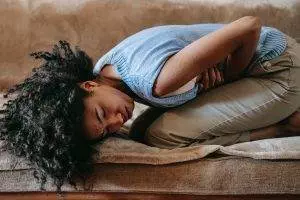
We all know what it is like to feel car sick or have a 24-hour stomach bug that makes us feel queasy and vomit. But sometimes we have recurrent nausea and do not know why.
The cause of nausea can sometimes be hard to pinpoint, if nausea comes and goes, or becomes a chronic, ongoing problem.
Top 10 Causes of Nausea
The medical conditions that most commonly cause nausea include:
- GERD – Acid reflux can cause excess salivation and regurgitation of food
- IBS – irritable bowel syndrome can lead to changing symptoms of nausea, gas, diarrhea, and constipation
- IBD – inflammatory bowel disease like ulcerative colitis can cause nausea, abdominal pain, and diarrhea
- Hepatitis – HBV or Hepatitis C can cause loss of appetite, nausea, and abdominal pain
- Migraines – nausea and vomiting can be part of a migraine headache
- Meniere’s disease – inner ear problem that can cause dizziness, vertigo, and nausea
- Anxiety – anxious feelings, depression, and other mental health issues like claustrophobia or PTSD can cause nausea
- Pregnancy – morning sickness
- Diverticulitis – inflamed sacs in the intestine can cause gas, bloating, and nausea
- Guillain-Barre syndrome – autoimmune disease affecting the neurological system can cause nausea in addition to muscle weakness and fatigue
- HIV/AIDS – people experiencing the acute phase of HIV often feel nauseated and fatigued
Being constipated can cause nausea.
Bacterial meningitis, swelling of the brain that can happen due to a bacterial or viral infection, can cause nausea, vomiting, and fever.
Celiac disease, an autoimmune disorder that affects digestion, can often cause nausea, bloating, and abdominal pain.
People often feel nauseated or vomit when experiencing a gallbladder attack or when passing a kidney stone.
Hormonal changes during PMS, the menstrual period, ovulation, and pregnancy can cause nausea.
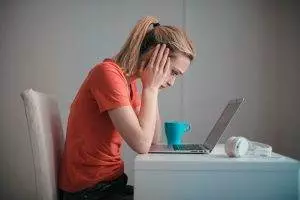
Nausea and vomiting can often be side effects of medications that are used to treat some conditions. Opioid painkillers, in particular, can cause dizziness and nausea.
Stomach ulcers, or peptic ulcers, can cause nausea, as can gastroparesis.
Antibiotics can cause nausea and diarrhea. Even NSAIDs like Ibuprofen and and Motrin can cause nausea or stomach upset. Some blood pressure medications can also cause queasiness.
Feeling nauseous is a common side effect of chemotherapy for cancer treatment.
TCM has acupuncture protocols and herbal formulas to help alleviate the nausea associated with all of the conditions listed above.
Nausea Medicine
Most people probably have OTC preparations to relieve nausea and stomach upset in their medicine cabinet, such as Pepto-Bismol, or Dramamine to prevent motion sickness.
If you seek medical care for recurrent or chronic nausea, you may be prescribed antiemetics (such as promethazine), which block the receptors in the brain that trigger nausea sensation.
Drugs known as prokinetic agents work by affecting the lower esophageal sphincter and moving food more quickly through the digestive system. Erythromycin and domperidone are examples.
Certain antihistamines, like Benadryl, are also sometimes prescribed to help reduce nausea, as they block certain chemical responses and reduce stomach acids that can cause nausea.
More recently, cannabinoids may be used medicinally to help quell nausea. These may be prescribed as a synthetic form of TCH.
While these medications may help to relieve nausea in some cases, they do generally come with side effects, like drowsiness, dizziness, constipation, or vision problems.
Acupuncture is widely considered to be an effective modality to treat nausea, without any side effects.
Can Acupuncture Help Nausea?
One of the foundational principles of TCM theory is that an acupuncturist may use the “same treatment for different diseases.”
This means that while a condition, such as nausea, may be caused by any one of several different internal or external factors, the treatment may be the same. It also refers to the concept that many different types of conditions can be caused by a disharmony in a particular organ system.
Therefore, using acupuncture and herbs to bring balance to a particular organ system can help relieve many disorders that would be considered separate and distinct from one another in modern conventional medicine.
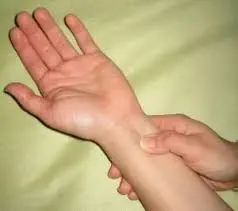
There are several key acupuncture points that will have a positive effect on the reduction of nausea, and no matter what is the cause of nausea, they will work in many cases to alleviate nausea in the short term. The point known as P6, in particular, is a classic point for quickly quelling queasiness.
Beyond that, a TCM practitioner will look carefully at other symptoms to find the root cause, which may be related to a deficiency of stomach or spleen Qi. These are the organs primarily responsible for the processing of food. If there is too much heat or phlegm in the stomach or spleen, there will be indigestion.
Emotional factors can also affect the stomach Qi. Worry, repetitive thoughts and rumination are associated with stomach problems in TCM. Acupuncture can also help to relieve the physical and emotional symptoms of anxiety.
The liver also plays a role in digestion, by producing bile. So when any one of these organs is stagnant or not functioning smoothly, it can cause indigestion and the reversal of stomach Qi – causing the energy to move upwards rather than downwards.
One study of patients suffering from mild to moderate nausea and dyspepsia who had not responded to conventional medications showed that symptoms were greatly reduced after just three acupuncture sessions.
Acupuncture can help relieve nausea caused by morning sickness and other conditions because it affects the release of endorphins and ACTH, a pituitary hormone that inhibits the vomiting trigger response.
A research study that looked at thousands of cases found the acupuncture was effective at reducing nausea due to morning sickness, as well as postoperative nausea and chemotherapy induced nausea.
Chinese herbs can also be used to help balance the organ Qi and to relieve stomach upset. Your acupuncturist will create a formula that addresses both nausea symptoms and the deeper issues that are the cause of nausea.
Ginger is also one of the most effective natural remedies for nausea. A few slices of fresh ginger, with the skin still on, steeped in hot water as a tea can help relieve nausea in many situations.
Acupuncture Near Me for Nausea in Los Angeles
TCM offers nausea help for people of all ages, with all types of health issues. Drs. Tan and Cai at Art of Wellness in West Los Angeles have 35 years of experience helping people with all types of gastrointestinal disorders, hormonal conditions, and autoimmune conditions. Our expertise in reproductive health allows them to help women who experience morning sickness or nausea during ovulation or menstrual issues. We also have extensive experience helping cancer patients who are undergoing chemotherapy feel more comfortable and deal with side effects of cancer treatment.
*This article is for education from the perspective of Traditional Chinese Medicine only. The education provided by this article is not approved by FDA to diagnose, prevent, treat and cure human diseases. It should not stop you from consulting with your physician for your medical conditions. Traditional Chinese Medicine is based on Qi, which is an invisible force that usually cannot be observed by modern science. Because science focuses on testing ideas about the natural world with evidence obtained through observation, these aspects of acupuncture can’t be studied by science. Therefore acupuncture and Chinese herbs are often not supported by double-blind, randomized trials, and they are considered alternative medicine therapies in the United States.
How to Treat Gallbladder Pain With Acupuncture and TCM
By Qineng Tan, L.Ac., Ph.D. and Xiaomei Cai, L.Ac., Ph.D.

Pain on right side abdomen? Sudden, sharp right abdomen pain? This could be a sign of a gallstone or gallbladder issue. Gallbladder attacks can cause severe gallbladder pain. Acupuncture and TCM can provide an alternative or adjunct treatment for gallstones symptoms.
The gallbladder is a small organ located on the right side of your abdomen, under the liver. The liver produces bile, a liquid that helps break down fats into fatty acids. The gallbladder stores bile and releases it into the small intestine as needed, to help with digestion.
When the bile that your body produces has too much cholesterol or bilirubin in it, or when bile is not draining out of the gallbladder properly, it can become too concentrated and begin to harden into a solid.
Gallbladder pain usually occurs because a person has gallstones, which are just what they sound like: little stones that develop inside the gallbladder and are made up mostly of cholesterol. The medical term for gallstones is “cholilithiasis.”
Many people have gallstones and are not aware of it. It is possible to have gallstones with no symptoms at all.
Top 5 Gallstone Symptoms
People who have gallbladder disease or gallstones are likely to experience a condition known as “biliary colic.” This means that they have an intolerance for fatty foods and may experience dyspepsia, nausea, and/or bloating when they eat something that disagrees with them.
Severe, sharp right side stomach pain is the most common sign of a gallbladder attack, which is when a gallstone becomes lodged in one of the small tubes or ducts that lead to and from the liver, gallbladder, and pancreas.
Gallbladder symptoms may include:
- Pain in lower right abdomen
- Nausea and/or vomiting
- Yellow skin and/or yellow eyes, jaundice
- Fever and/or chills
- Brown pee, brown urine, light-colored poop
Sometimes gallbladder pain can refer to the right shoulder, or between the shoulderblades.
Gallbladder pain can also happen due to inflammation of the gallbladder. This condition is known as cholecystitis and occurs when a gallstone blocks the duct that leads out of the bladder, causing bile and bacteria to build up and become infected.
Stones can sometimes become lodged in the common bile duct, which not only causes pain, but can lead to pancreatitis. Gallstones are the primary cause of acute pancreatitis, in which the pancreas becomes irritated and inflamed due to a backup of bile and/or digestive enzymes.
The pain of a gallbladder attack is unignorable. If it doesn’t go away within a few hours, most people choose to go to the emergency room for urgent care.
Gallstones may pass on their own, or drugs are sometimes used to help dissolve the gallstones. These drugs can be expensive, and sometimes cause problems like atherosclerosis, or fatty buildup in the arteries.
When gallstone pain comes and goes, and the gallstones are present but not causing the blockage of a duct, usually pain management and patience are the only treatment.
If gallbladder issues keep coming up, the typical medical treatment is gallbladder surgery.
Acupuncture can offer an alternative treatment to help relieve gallbladder pain. TCM is considered an effective treatment for biliary colic due to gallbladder disease.
Gallbladder Removal
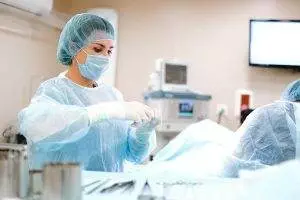
It is very common for people presenting with acute pancreatitis or a gallbladder attack to have a cholecystectomy, or gallbladder removal. Over 300,000 cholecystectomies are performed in the U.S. each year.
While this gallbladder surgery is usually done laparoscopically and is minimally invasive, there are disadvantages to living without a gallbladder.
Some people have what is known as postcholecystectomy syndrome, in which they continue to experience pain on right side abdomen, heartburn, nausea, indigestion, and vomiting, even though their gallbladder is gone.
Some research studies have suggested that gallbladder removal may not be necessary or desirable for everyone. It may be worth considering alternative or adjunct gallbladder pain treatment with TCM and acupuncture.
Can Acupuncture Help Gallbladder Symptoms?
Chinese medicine has been used to treat gallstones for thousands of years, without surgery.
According to TCM theory, the gallbladder is the Yang organ that ideally works cooperatively and in harmony with the Yin liver. The gallbladder is an extraordinary organ in that it is part of the digestive system, but it never comes in direct contact with the food you eat. It stores and secretes bile to help break down fats.
In TCM, we consider the gallbladder to represent the part of our nature that makes decisions, takes action, and feels inspired. When the liver and the gallbladder are not functioning smoothly, we may feel frustrated, angry, and depressed. Repressing anger can exacerbate gallbladder problems, as can eating the wrong foods.

In TCM, the gallbladder is associated with spring, and the wood element. It is best nourished with lots of dark, leafy greens, herbs, roots, and green tea. Eating too many fatty, fried foods, and drinking too much alcohol can have a very negative effect on both the liver and gallbladder.
The stimulation of acupoints along the gallbladder meridian can help to regulate the sphincters of the gallbladder and its action, and help to promote the secretion of bile so that it does not remain stagnant inside the gallbladder.
Acupuncture can also have an analgesic effect that may even be superior to that of NSAIDs pain relief medications, without any of the side effects that may occur with regular use of these drugs.
Acupuncture can also be used to treat chronic cholecystitis, the chronic inflammation of the gallbladder due to infection. TCM treatment can help reduce inflammation and improve immune function so that infections can be more easily fought off.
Acupuncture and TCM can also be used as an adjunct treatment to help boost the efficacy of conventional medications. One study showed that patients who were given cefodizime for chronic cholecystitis and also received acupuncture had a 98% effective rate, as opposed to patients who received the medication only, who had only a 50% effective rate.
There are many Chinese herb preparations designed to help with gallstones. These formulas are based on TCM theories related to clearing the stagnation of Qi and blood in the liver and gallbladder, removing dampness and heat and treating yin deficiency.
These herbs have been shown to help discharge gallstones, control the metabolism of bilirubin, and help to prevent the formation of new stones in the future.
Acupuncture Near Me for Gallbladder Pain in West Los Angeles
Acupuncture and TCM can provide natural treatments for gallstones and many other problems related to the digestive system, such as diarrhea, constipation, Crohn’s disease, colitis, IBS, diverticulitis, and celiac disease. If you are experiencing abdominal pain and other digestive symptoms, consider consulting with a TCM practitioner. Acupuncture can help prevent conditions like gallstones from getting worse.
*This article is for education from the perspective of Traditional Chinese Medicine only. The education provided by this article is not approved by FDA to diagnose, prevent, treat and cure human diseases. It should not stop you from consulting with your physician for your medical conditions. Traditional Chinese Medicine is based on Qi, which is an invisible force that usually cannot be observed by modern science. Because science focuses on testing ideas about the natural world with evidence obtained through observation, these aspects of acupuncture can’t be studied by science. Therefore acupuncture and Chinese herbs are often not supported by double-blind, randomized trials, and they are considered alternative medicine therapies in the United States.
How to Treat Kidney Stones With Acupuncture and TCM
By Qineng Tan, L.Ac., Ph.D. and Xiaomei Cai, L.Ac., Ph.D.
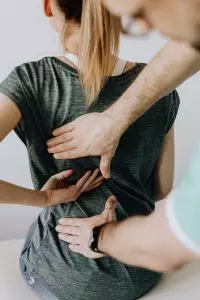
Severe lower back pain, blood in urine, burning pee? These could be signs of kidney stones. Acupuncture and TCM offer an alternative or adjunct kidney stones treatment that can help relieve kidney stone pain and dysuria, or painful urination.
Kidney stones are hard mineral deposits that form in the kidneys or other parts of the urinary tract. Salt and minerals can crystallize when urine reaches a certain level of concentration.
Often, kidney stones form when there are calcium oxalate crystals in urine. Calcium levels can be high because of eating too much sodium.
The ureters are the tubes that connect the kidneys to the bladder. If a kidney stone moves into a ureter and becomes lodged there, it can cause left lower back pain or right lower back pain. This is known as “passing a kidney stone.”
Kidney stones are very common, and many people go to the ER when they are experiencing severe lower back pain on one side and peeing blood. This happens when one or more kidney stones find their way into one of the ureters and become lodged there. This blocks the flow of urine and can cause severe pain and cramping.
Acupuncture can help reduce kidney stone pain in the short term, and help address the imbalances that are the root cause of kidney stones.
What Causes Kidney Stones?

Kidney stones form when there is not enough urine, and it becomes too concentrated. This often is due to not drinking enough fluids and getting dehydrated. Other kidney stone causes include:
- Not drinking enough water, dehydration
- Too much salt
- Too much sugar, fructose, or high fructose corn syrup
- Too much meat, too few fruits and vegetables
- Lack of exercise or too much exercise
- weight loss surgery, bariatric surgery, which can cause chronic diarrhea
- Infections, UTIs
- Gout
- Chronic diarrhea due to Crohn’s disease, ulcerative colitis
- Type 2 Diabetes, high blood sugar levels
Kidney stones are differentiated into different types, depending on their mineral composition. The types of kidney stones are:
- Calcium stones – deposits of calcium oxalate or calcium phosphate
- Uric acid stones – high levels of uric acid can be due to eating a lot of animal proteins
- Struvite stones – can form after a UTI
- Cystine stones – cystinuria is an inherited condition that causes buildup of the amino acid cystine in the urinary tract
Top 10 Symptoms of Kidney Stones
Many people have kidney stones and are not aware of them. It is possible to have kidney stones without pain or kidney stones without urinary symptoms. You may only find out about them when having imaging tests done for some other reason.
However, passing a kidney stone can certainly cause intense pain and other upsetting symptoms. The most common signs of kidney stones include:
- Sharp pain on one side of the lower back
- Cramps in one side
- Pain in the lower abdomen or groin
- Urgent need to pee, urinary urgency
- Peeing a lot, urinary frequency
- Burning sensation when peeing, dysuria
- Dark urine, blood in urine
- Nausea, vomiting
- Pain at the tip of the penis
- Fever and/or chills
Kidney stone pain can range from mild to severe, and it can come and go or be constant.
Acupuncture treatment has been shown to be effective for reducing kidney stone pain when used as an adjunct in emergency medical care settings when someone is waiting for conventional treatment.
Treatment for Kidney Stones
Kidney stones are diagnosed through blood tests and urine tests, which will show if there is too much uric acid, calcium, or other minerals that can cause stones to form. Imaging tests, such as ultrasound, may be able to detect where stones are stuck in the urinary tract.
If a person is passing stones (kidney stones in toilet), they may be analyzed to determine what sort of mineral has formed them.
In many cases, people will be encouraged to wait until the stones pass on their own. In this case, simply drinking adequate fluids and using pain medication to manage the intermittent pain and cramping will be recommended. Medications such as alpha blockers (Flomax) may be prescribed to help relax the ureters.
If the kidney stones are too large to be passed, then surgery may be indicated. Procedures using sound waves are sometimes used to help break up the stones. Surgery using small scopes and instruments can also remove the stones. A stent may be placed in the ureter to help keep it open until swelling goes down and it heals.
Studies have indicated that a combination of medications like Flomax and Chinese herbs may help to expel kidney stones. TCM treatment can help prevent the need for surgery.
Can Acupuncture and Herbs Help Kidney Stones?
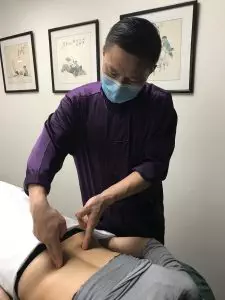
According to TCM theory, kidney stones are in the category of “Shilin” conditions, in which urination is difficult. Chinese herbs have traditionally been used to help balance the electrolyte minerals in the body, which helps prevent stones from forming in the urinary tract.
TCM treatment for kidney stones includes herbal medicine to help increase urine volume and excretion of minerals and inhibits the formation of calcium crystals.
Acupuncture treatment has an anesthetic effect which can help relieve the pain of kidney stones while other treatments take effect to help reduce and prevent the formation of new kidney stones.
One trial found that acupuncture treatment helped relieve kidney stone pain faster than pharmacological medications. Acupuncture treatment has no side effects, while 43% of the people in the study who were given intramuscular anesthesia report side effects like skin rash, irregular heartbeat, and drowsiness.
Acupuncture and acupressure can help relieve severe back pain and pelvic pain due to various urinary and other reproductive system conditions. It can also help reduce the anxiety and depression that people sometimes experience when faced with severe pain.
How to Prevent Kidney Stones
Drinking plenty of water is probably the most important thing you need to do to prevent dehydration and low volume of urine. In addition to staying hydrated, you should:
- Reduce sodium intake by eating less salt and fewer processed and packaged foods.
- Reduce foods that encourage calcium oxalate stones: meats, berries, beer, black pepper, spinach, chocolate/cocoa, and tea.
- Combine calcium-rich foods or drinks with foods that contain oxalate, so that they can be absorbed well together. This could mean eating spinach with cheese, or berries with yogurt. The citrate in citrus juices can also help discourage stone formation.
- Add foods with a high ratio of magnesium to calcium, such as: brown rice, oats, barley, bananas, soybeans, and flaxseeds.
- Be sure to replace lost fluids when you sweat through exercise or by being in a sauna, steam room, or hot tub, or just by being in the heat during the summertime.
- Balance your Ph levels. For some people this may mean increasing alkaline foods. As your acupuncturist about checking your Ph levels.
Acupuncture Near Me for Kidney Stones, Los Angeles
TCM treatment can help reduce pain and address the root causes of many conditions that cause urinary urgency and frequency, like BPH, UTIs, chronic kidney disease (CKD), and interstitial cystitis. Acupuncture can also help relieve pelvic pain and low back pain due to many other conditions, like endometriosis, and mittelschmerz. If you are experiencing urinary symptoms or recurring bladder pain or back pain, consider consulting an experienced acupuncture practitioner to resolve the root issue.
*This article is for education from the perspective of Traditional Chinese Medicine only. The education provided by this article is not approved by FDA to diagnose, prevent, treat and cure human diseases. It should not stop you from consulting with your physician for your medical conditions. Traditional Chinese Medicine is based on Qi, which is an invisible force that usually cannot be observed by modern science. Because science focuses on testing ideas about the natural world with evidence obtained through observation, these aspects of acupuncture can’t be studied by science. Therefore acupuncture and Chinese herbs are often not supported by double-blind, randomized trials, and they are considered alternative medicine therapies in the United States.
How to Treat Hay Fever With Acupuncture and TCM
By Qineng Tan, L.Ac. Ph.D. & Xiaomei Cai, L.Ac., Ph.D.

Itchy eyes, runny nose and sneezing? These are some of the classic seasonal allergy symptoms, also known as allergic rhinitis, or hay fever. Acupuncture and TCM herbs can help relieve allergies, including pollen allergy symptoms.
Seasonal allergies affect about 20% of Americans. Allergic rhinitis is an immune system reaction to an allergen in the air that can be inhaled, like pollen from budding trees, growing grass, and plants like ragweed. Hay fever is a common term that typically describes being allergic to pollen.
“Pollen” are tiny seeds from plants that can be carried by the wind. When there is lots of pollen in the air, this is called a high pollen count. You can check the pollen count, like a weather report, to see when it is particularly high, and thus may affect people who suffer from seasonal allergies and asthma.
While having an allergic reaction to common airborne allergens happens most often during the spring, summer, and early fall, when plants are giving off a lot of pollen, people can actually experience hay fever at any time of the year.
Similar allergy symptoms can occur due to exposure to dust mites, molds, and pet dander.
Acupuncture and TCM can help relieve the irritating symptoms caused by allergic reactions by helping to strengthen and balance the immune system so that it is not so easily triggered.
Top 10 Seasonal Allergy Symptoms
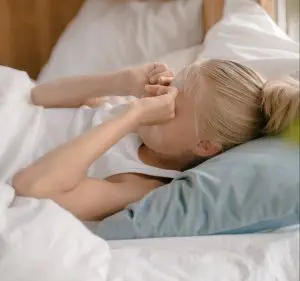
The body’s histamine response causes inflammation of the mucus membranes in the sinuses and throat. The increased mucus production occurs in order to drive out the offending allergens.
Pollen allergy symptoms are similar to those of the common cold. Signs of hay fever include:
- Sneezing
- Nasal congestion
- Runny nose, itchy nose
- Itchy eyes, watery eyes (allergic conjunctivitis)
- Itchy throat
- Postnasal drip
- Headaches, sinus pain
- Dark circles under eyes, puffy eyes, “allergic shiners”
- Fatigue, malaise, generally feeling under the weather
- Wheezing, coughing, trouble breathing
Skin rash is a less common symptom of seasonal allergies, but some people do develop a hay fever rash. The itchy allergy rash may look similar to hives: raised red welts on the skin.
Treatment for Hay Fever
The common medical treatment for hay fever is an antihistamine. Histamines are chemicals that occur naturally in the body as part of the immune response to allergens in the environment. The release of histamines is what leads to allergy symptoms like a runny nose and itchy eyes.
Antihistamines come in pill or spray form, and they block the histamine response, which can temporarily relieve the hay fever symptoms. However, these medications do have side effects, the most common of which is drowsiness.
If someone is not getting relief from antihistamines, then corticosteroids, or steroids, may be prescribed. These work as anti-inflammatories, which in this case means that they reduce the swelling of mucous membranes. Steroids, too, can have significant side effects, especially when used over a long period of time.
Nasal sprays for allergies, like Flonase or Mucinex, are decongestants that are designed to be sprayed into the nose to help reduce allergy runny nose. Again, these may provide some temporary relief, but people can quickly get used to them, so they stop being effective.
Acupuncture and TCM offer an alternative treatment for allergies that can help relieve hay fever symptoms without side effects.
Can Acupuncture Help Hay Fever?

According to TCM theory, allergies fall under the category of illnesses that are caused by “wind” as a pathogenic force that can invade the body. In the TCM view, hay fever occurs due to wind-heat getting into the lungs.
Weakness of the kidneys and spleen can also contribute to hay fever; when they are sluggish, mucus tends to build up, and we become more easily fatigued.
When the defensive Qi is strong, it can protect us from cold, heat, wind, and dampness getting into the body and causing problems. Defensive Qi is roughly analogous to what we think of as the immune system in conventional medicine.
TCM treatment for allergic rhinitis may include acupuncture, herbal supplements, moxibustion, and nutrition counseling. TCM can be used either as an alternative therapy for allergies, or as an adjunct treatment for hay fever, along with pharmacological treatment.
Chinese herbs have been used for many centuries to treat allergy symptoms. Now, we are able to see scientific evidence that these herbs, such as astragalus, magnolia flower, and licorice root, do actually have an effect on the immune response and histamine function by helping to regulate the production of chemicals like cytotoxic T-cells and immunoglobulin G. Compounds found in scutellaria root have been found to inhibit the production of inflammatory cytokines, and stephania root can help prevent anaphylaxis.
With Chinese herbal medicine, we are able to create customized formulas for each patient, depending on their particular presentation of symptoms.
Acupuncture is a highly effective modality for all types of allergies, from allergic rhinitis to atopic dermatitis or eczema, and can help relieve the nasal sinus symptoms that affect the eyes, nose and mouth if someone is allergic to pollen. It can also help reduce itching due to allergic skin rashes.
A clinical trial conducted at a hospital in China showed that a regimen of acupuncture and herbs resulted in over 90% of patients reporting that their nasal symptoms were greatly reduced.
Another published study showed that acupuncture reduced levels of Immunoglobulin-E, an antibody that is associated with allergy responses.
A review of studies of acupuncture for allergic rhinitis showed that this treatment has both short-term and long-term efficacy.
TCM treatment for seasonal allergies allows us to get to the root cause of allergy symptoms and help prevent them from happening. In this way, acupuncture and herbs can function as preventive medicine for hay fever. Getting acupuncture periodically throughout the year can help you avoid allergy attacks when the pollen count is high.
Top 3 Tips for Hay Fever Prevention
Here are some things you can do to help prevent spring hay fever and relieve pollen allergy symptoms:
- Avoid dairy food and cold foods, which promote more mucus production.
- Apply warm compresses to the face to soothe the eyes and nasal area.
- Use an air purifier in your home to keep allergens out of the environment.
To relieve allergies, emphasize more cooked foods that help warm the body.
Acupuncture Near Me for Hay Fever in Los Angeles Area, Santa Monica
The multifaceted approach of TCM makes it uniquely suited to help relieve seasonal allergy symptoms. Acupuncture can help reduce hay fever symptoms right away and help prevent allergies from knocking you down every time the pollen count is high. Please do not hesitate to seek relief from hay fever by giving acupuncture and herbs a try.
*This article is for education from the perspective of Traditional Chinese Medicine only. The education provided by this article is not approved by FDA to diagnose, prevent, treat and cure human diseases. It should not stop you from consulting with your physician for your medical conditions. Traditional Chinese Medicine is based on Qi, which is an invisible force that usually cannot be observed by modern science. Because science focuses on testing ideas about the natural world with evidence obtained through observation, these aspects of acupuncture can’t be studied by science. Therefore acupuncture and Chinese herbs are often not supported by double-blind, randomized trials, and they are considered alternative medicine therapies in the United States.